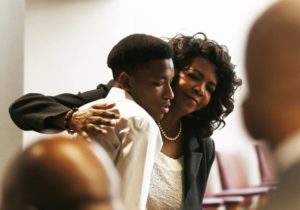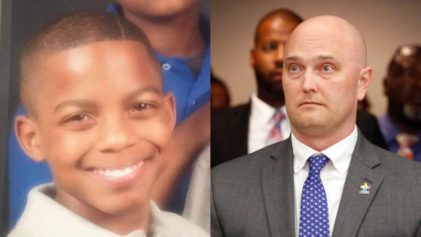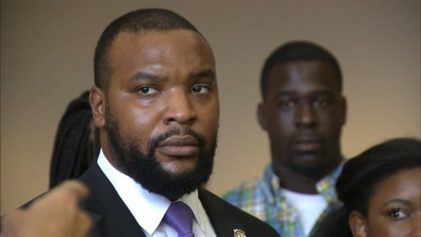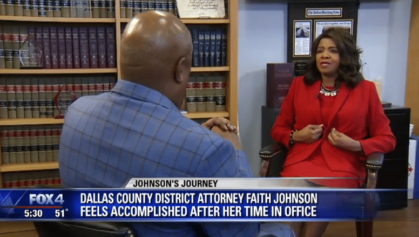
Dallas County District Attorney Faith Johnson hugs Kevon Edwards, the older brother of Jordan Edwards, during the trial of former Balch Springs police officer Roy Oliver, who is charged with the murder of 15-year-old Jordan Edwards, at the Frank Crowley Courts Building in Dallas on Monday, Aug. 27, 2018. (Rose Baca/The Dallas Morning News via AP, Pool)
DALLAS (AP) — A white former police officer was convicted of murder on Tuesday for fatally shooting an unarmed black teenager when he fired into a car full of teenagers leaving a house party in suburban Dallas.
Dallas County jurors were not swayed by former Balch Springs police officer Roy Oliver’s claim that he feared for his partner’s life when he fired into the vehicle. The gunfire killed 15-year-old Jordan Edwards, who was sitting in the front passenger seat.
Gasps echoed around the courtroom as the verdict was read. Edwards’ relatives sobbed and hugged prosecutors, and waved their hands in the air and proclaimed “Thank you, Jesus!” after the jury left.
Oliver and his partner were responding to a report of underage drinking at a house party when the shooting occurred in April 2017. Oliver was fired from the Balch Springs Police Department days later.
Oliver testified during the trial that he opened fire after seeing the car move toward his partner. But his partner told jurors he didn’t fear for his life.
Oliver also was found not guilty on two lesser charges Tuesday stemming from the shooting. Following the verdict. the judge ordered the jury into proceedings to decide Oliver’s punishment after a short break.
“This was a long fought battle,” said Daryl Washington, an attorney representing Edwards’ family in a civil lawsuit they’ve filed in the matter.
Odell Edwards, Jordan’s father, said he was thankful for the jury’s decision in brief comments before heading back into the courtroom to begin listening to the sentencing phase.
The shooting launched Balch Springs into a national conversation on issues of law enforcement and race. Experts said ahead of the trial that securing convictions against an officer was challenging, in part because criminal culpability in on-duty shootings is subjective and jurors are more inclined to believe police testimony.
In closing arguments, defense attorneys told the jury they needed to evaluate the circumstances from Oliver’s viewpoint and from what the former officer knew at the time.
But prosecutors described Oliver as out of control and looking for a reason to kill. They argued that his firing into the car wasn’t reasonable.
The shooting came after Oliver and his partner, Tyler Gross, had broken up a large house party following a report of underage drinking. Both officers were inside the residence when they heard gunfire outside and responded. Authorities later determined the shots were fired near a nursing home in the area.
Oliver retrieved his rifle and went toward Gross, who was ordering the car carrying Edwards to stop. Oliver testified that he saw the car back up and stop for a second before moving forward and going toward Gross.
Testifying in his own defense, Oliver told the jury the car was about to hit his partner. Oliver said he felt he had no other option but to fire.
Gross, however, testified that he did not fear for his life and never felt the need to fire his weapon. He also said he didn’t feel like the vehicle was trying to hit him.
Prosecutors said Oliver fired after the vehicle passed Gross. Investigators also said no guns were found in the teens’ vehicle.


